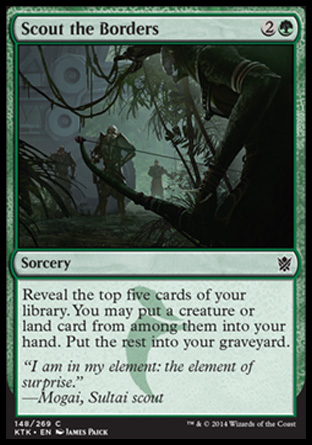Are you a Quiet Speculation member?
If not, now is a perfect time to join up! Our powerful tools, breaking-news analysis, and exclusive Discord channel will make sure you stay up to date and ahead of the curve.
Sometime in the last few months scouting has become a hot topic in the Magic community. I don't recall where the allegations came from, but the issue was framed as pros having access to spreadsheets of players and the archetypes that they were playing and sharing this information with other members of super-teams gave them an unfair advantage.
This position seems a little silly to me considering that top-level pros tend to get the most exposure from the coverage team. Their decks are featured in feature matches and deck techs, which exposes a lot more information than an archetype in a spreadsheet. This exposure is what makes the Pro Tour even possible, so it obviously isn't going anywhere.
Matt Sperling wrote an article for Channel Fireball yesterday outlining the problems with scouting and offering potential solutions, though there are a number of difficulties in working through the problem- if you even view scouting as such.
When it comes to Standard, it's been a long time since knowing my opponent's archetype has had a dramatic impact on my mulligan decisions. This information does have a much higher impact on Modern and Legacy mulligans though, where Lightning Bolt can either be the best card in your deck or a functional mulligan.
Even still, the advantage gained by mulliganing aggressively is minimal. The cards that you don't want to draw are still in your deck, and you are starting with one fewer card in your hand after all. I have never put in the effort to scout, as despite the fact that it's very easy to scout, the benefit still isn't worth it. Even when players have approached me to tell me what my opponent was playing before a round, the information has never benefited me in any meaningful way.
I am curious though. Regardless of the practicality of a solution, do you think that scouting has a place in Magic? Does it matter that the advantage is negligible, or is any advantage from discovering deck information constitute too much of one? Does it matter that any team is capable of scouting? Please expound on your opinion in the comments!






Though not scouting, while playing in a legacy tournament, I sat down across from a guy with a goblin deck box, and goblin sleeves (and I was playing Miracles) so I kept a hand of that was really good against Goblins (but terrible against something like storm or sneak and show) and was promptly rewarded when he played a turn 1 Goblin Lackey. I only bring it up, because similar to scouting knowing what your opponent is playing is a HUGE advantage in certain formats.
I agree that this knowledge can be huge. If I play MTGO, I always google my opponent first. I always find a few decklists in a database because the guy finished 3-1 in a daily. And I guess 80-90% of the time, he is playing the same deck.
This really works!
The problem for paper magic scouting is only an issue on such big events. So personally, I don’t care. If someone wants to spend his time doing that, let him. You can’t scout every possible deck.
On the other hand, as a judge, I would love to get people watching games out of the way. They just don’t want to go out of the way, blocking every possible passage you need to answer a judge call. On day 2 on a GP, depending on the head judge, we remove spectators within the player area. Clearly not because of scouting, but other practical aspects. So it’s possible to make that a rule or something.
Scouting is sanctioned by tournament hosts. When players go into the top-8 or top-16 they have access to the decklist of one another. If the hosts allow for it then why can’t players do it themselves during other rounds.
The conversation is focused entirely around the early rounds of the tournament. The question is also not whether it’s currently allowed, but whether it has a place.